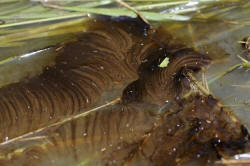|
ExxonMobil Pipeline Company's Silvertip pipeline burst July 1,
2011 at a crossing beneath the flood-swollen Yellowstone River
near Billings, Montana, about 150 miles (241 km) downstream from
Yellowstone National Park.
The release of 1,500 barrels of crude oil affected 85 miles of a
river known for its near pristine waters, wealth of wildlife and
world-class fisheries.
Under the agreement unveiled Wednesday, funds from Exxon would
be used to mitigate harm caused by the spill to fish, wildlife,
migratory birds and aquatic habitat.
A restoration plan drafted by the state and federal governments
would, among other things, seek to restore riparian and
terrestrial habitats, stabilize river banks and expand fishing
access in and around the river.
The deal struck between the Texas-based oil company and Montana,
the U.S. Department of Justice and other federal agencies still
must be approved by a U.S. District Court judge in Montana and
is subject to 30 days of public comment, legal documents show.
The settlement and proposed restoration plan follow a years-long
assessment of damages from the pipeline leak to the river and
its floodplains.
Montana Governor Steve Bullock and Attorney General Tim Fox
hailed the agreement for holding Exxon accountable and helping
to make whole a state that boasts a $6 billion outdoor economy.
But Alexis Bonogofsky, whose pastures along the Yellowstone
River were fouled five years ago by oil-tainted water said she
was disappointed by the size of the settlement.
"I'm sorry, but $12 million is a drop in the bucket for
ExxonMobil and doesn't teach them anything about
accountability," she said.
Exxon spokeswoman Ashley Smith Alemayehu said the company was
sorry for the accident.
"We regret this spill happened and are committed to learning
from it to prevent similar incidents from occurring in the
future," she said in a statement.
Under a 2012 deal between Exxon and the Montana Department of
Environmental Quality, the oil company paid a fine of $1.6
million in connection with the spill, the largest penalty ever
levied in the state for violations of its water quality
regulations.
The same year, Exxon estimated its overall response to the
spill, including cleanup, would cost $135 million and said it
had reached compensation agreements with more than 95 percent of
affected property owners.
(Reporting by Laura Zuckerman in Salmon, Idaho and Tim Ahmann in
Washington; Additional writing by Mohammad Zargham; Editing by
Sharon Bernstein and Alan Crosby)
[© 2016 Thomson Reuters. All rights
reserved.] Copyright 2016 Reuters. All rights reserved. This material may not be published,
broadcast, rewritten or redistributed.
 |
|





